英语修辞格
英语修辞学中20种常见修辞格名称双语释义及举例
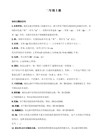
What does that lawyer do after he dies?——Lie still. 那个律师死后干什么?──躺着仍说鬼话。(注:lie躺, 撒谎;still安静地, 仍然)
E. oxymoron; zeugma ; contrast
Oxymoron(矛盾修辞法)与汉语中的反映辞格类似,都是将相互矛盾的概念和判断巧妙地联系在一起,以便相互映衬,突出事物的特点,表达复杂的思想感情和意味深长的哲理。矛盾修辞手法在英语中常见,但在汉语中很少见。如:sweet sorrow 忧喜参半 (不是甜蜜的悲伤); proud humility 不卑不亢(不是骄傲的谦卑)
这个项目从一开始就是一个摆脱不了的经济难题。(Albatross是英国诗人柯勒律治的《古舟子咏》中的信天翁,它被忘恩负义的水手杀死后,全船陷入灾难中。)
B. metonymy; transferred epithet Metonymy、synecdoche和_1antonomasia都是不直接说出事物的本来名称,而换用另一个名称或另一个说法。它们大体上相当于汉语的借代(分为旁借和对代两类)。如Crown(王冠)可喻指君主、王权、王国政府等;doll(玩具)可喻指姑娘、宝贝等。再如:
as thick as thieves亲密无间(不是"像贼一样厚")
as old as the hills古老 (不是"像山一样老")
The ship plows the sea. 船在乘风破浪地前进。(不是"船在犁海")
Allusion与汉语的暗引相近似。其特点是不注明来源和出处,一般多引用人们熟知的关键词或词组,将其融合编织在作者的话语中。引用的东西包括典故、谚语、成语、格言和俗语等。英语引用最多的是源出《圣经》故事以及希腊、罗马神话、《伊索寓言》和那些渊源流长的谚语、格言等。例如:
英语常见修辞格总结

脏几乎都停止了跳动。
反语Irony['airəni]
反语(irony)是指用含蓄的褒义词语来表示 其反面的意义,从而达到使本义更加幽默, 更加讽刺的效果。(正话反说或是反话正说) 1、It would be a fine thing indeed not knowing what time it was in the morning. 2、Well, of course, I knew that gentlemen like you carry only large notes.
顾名思义,音韵修辞格是利用词语的语音特 点创造出来的修辞手法。 它主要包括 拟声(onomatopoeia)、头韵 (alliteration)这两种修辞格。
拟声 Onomatopoeia [,ɒnəmætə'piːə]
Onomatopoeia 是模仿事物发出的声响的修 辞手法,与汉语的拟声用法完全相同。 1、Presently there came the click of highheeled shoes. 高跟皮鞋声阁阁地传了过来。 2、 On the root of the school house some pigeons were softly cooing. 在学校房屋的屋顶
三、句法修辞格(syntactical rhetorical devices)
句法修辞法主要是指通过句子结构的均衡布 局或是突出重点创造出来的修辞手法。 这类修辞格主要包括 叠言 rhetorical repetition, 反问rhetorical question, 对偶 antithesis等。
明喻 simile和暗喻metaphor
明喻(simile)是以两种 具有相同特征的事物和 现象进行对比,表明本 体和喻体之间的相似关 系。
英语常用修辞格复习

常用修辞格复习(定义并例证各术语) 一、使用语音手段的修辞格1.Alliteration(头韵):2.Assonance(元韵):3.Consonance(辅韵):4.Onomatopoeia(拟声):5.Aposiopesis(跳脱):6.Apostrophe(呼告):7.Pun(双关):二、使用词汇手段的修辞格1.Simile(明喻)2.Metaphor(隐喻)3.Transferred epithet(移就)4.Personification(拟人)5.Oxymoron(矛盾修辞法)6.Allusion(典故)7.Analogy(类比)8.Allegory(讽喻)9.Synecdoche(提喻)10.Euphemism(委婉语)11.Metonymy(借代)12.Parody(仿拟)13.Hyperbole(夸张)14.Irony(反语)15.Pun(双关)16.Antonomasia(换称)17.Synaesthesia(通感)18.Understatement(低调陈述)19.Zeugma(轭式搭配)20.Syllepsis(一笔双叙)21.Anticlimax(突降)22.Climax(层进)三、使用句法手段的修辞格1.Loose sentence(松散句)2.Periodic sentence(圆周句)3.Antithesis(对偶句)4.Parallelism(排比句)5.Repetition(反复)6.Ellipsis(省略)7.Inversion(倒装)8.Rhetorical question(反问句)A General Review on Figures of SpeechIdentify the figure(s) of speech used in the following sentences.1. "Your Heavens, give me that patience, patience I need!" (Shakespeare)2. Finally, brethren, whatever is true, whatever is honorable, whatever is right, whatever is pure, whatever is lovely, whatever is of good repute, if there is any excellence and if anything worthy of praise, let your mind dwell on these things. (The Bible)3. We felt strong, smug, secure.4. Return to her?…No, rather I abjure all roofs, and choose…To be a comrade with the wolf and owl…(Shakespeare)5. "One of my kids wrote four-letter words in his composition," the teacher said.6. When I was a child, I used to speak as a child, think as a child, reason as a child; when I became a man, I didaway with childish things. (The Bible)7. And do whate'er thou wilt, swift-footed time,To the wide world and all her fading sweets;But I forbid thee one most heinous crime. (Shakespeare)8. All are not apostles, are they? All are not prophets, are they? All are not teachers, are they? All are not workers of miracles, are they? (The Bible)9. Now, what advantage do we derive from hearing a man say that he has shaken off the yoke, that he does not believe that there is a God who watches over his actions, that he regards himself as sole judge of his conduct, and that he does not think of accounting for it to anyone but himself? Does he imagine that by saying this he is encouraging us to feel great confidence in him in the future and to expect comfort, advice, and help from him in the difficult situations of life? Do such men imagine that they have greatly rejoiced us by telling us that they think our soul is only a puff of wind or smoke, and still more by telling us so in an arrogant, self-satisfied tone? Is it a thing to be said cheerily? Is it not rather something to be admitted mournfully as though it were the saddest thing in the whole world? (Pascal)10. Good breeding consists in concealing how much we think of ourselves and how little we think of the otherperson. (Mark Twain)11. Shall the potter be considered as equal with the clay, that what is made should say to its maker, "He did not makeme";or what is formed say to him who formed it, "He has no understanding"? (The Bible)12. Greatness, in the works of architecture, may be considered as relating to the bulk and body of the structure.…Not to mention the Tower of Babel, of which an old author says there were the foundations to be seen in his time, which looked like a spacious mountain…(Joseph Addison)13. Now is the time to rise from the dark and desolate valley of segregation to the sunlit path of racial justice. Nowis the time to open the doors of opportunity to all of God's children. Now is the time to lift our nation from the quicksands of radial injustice to the solid rock of brotherhood. (Martin Luthur King)14. You earn your living and you urn your dead.15. Other things may be seized by might, or purchased with money, but knowledge is to be gained only by study,and study to be prosecuted only in retirement.(Samuel Johnson)16. For ours is the age of four "A's":anxiety, apprehension, agonizing, and aspirin. (James Thurber)17. So will these unattractive and mysterious objects lead to a new world economic order, or will the game beplayed according to the usual industrial rules; from each according to his ability, to each according to his investments?18. 0 soul of mine, will you never be good and sincere, all one, all open, visible to the beholder more clearly thaneven your encompassing body of flesh? Will you never taste the sweetness of a loving and affectionate heart?Will you never be filled full and unwanting; craving nothing, yearning for no creature or thing to minister to your pleasures, no prolongation of days to enjoy them, no place or country or pleasant clime or sweet human company? (Marcus Aurelius)19. It is in art as in morals; no character would inspire us with an enthusiastic admiration of his virtue, if that virtueconsisted only in an absence of vice; something more is required; a man must do more than merely his duty to be a hero.(Joshua Reynolds)20. It is no use doing what, you like; you have, got to like what you do. (W Churchill)21. To be, or not to be; that is the question:Whether 'tis nobler in the mind to sufferThe sting and arrows of outrageous fortune:Or to take arms against a sea of troubles,And by opposing end them…(Shakespeare)22. ... Let them recognize that there are only two kinds of person whom we can describe as reasonable; those whoserve God with all their heart because they have found him, and those who seek him with all their heart because, they have not found him. (Pascal)23. O, who can hold a fire in his handBy thinking on the frosty Caucasus?Or cloy the hungry edge of appetiteBy bare imagination of a feast?Or wallow naked in December snowBy thinking on fantastic summer's best? (Shakespeare)24. Let us be ruthless in our criticism, cruel to personal vanities, indifferent to age, rank or experience if these standin our way. Let all theories be subjected to the bright clear light of practice. (Norman Bethune)25. I Came BackI came back to softness and comfort.I came back to Dr. White's.And I wonder why I ever went away.Because only Dr. White's gives me two kinds of comfort. The supper-comfort of their cotton-wool content that makes them so much softer. And the comfort of a safer, more absorbent towel, with a flush-away design, too,for even more convenience.I tried the rest, but I came back.Isn't it time you came back to Dr. White's?Dr. White's Two kinds of comfort. (Women, Apr. 1977)26. What may be done at any time will be done at no time. (Proverb)27. You might as well expect a leopard to change its spots as expect him to give up smoking.28. He intended to take an opportunity this afternoon of speaking to Irene. A word in time saves nine…(John Galsworthy)29. A little boy came up to his mother. "Ma," he said, "I have something to tell you. My teacher kissed me.”"Well, were you a good boy and did you kiss her back?""Of course not!" he denied indignantly, "I kissed her face.”30. I don't have any rich relations who well leave me money when they die. Whatever I get in life, I'll have to earnby the sweat of my brow.31. Magnus. Frankly, I have been accustomed to regard your President as a statesman whose mouth was the mostefficient part of his head. (Bernard Shaw)32. No longer mourn for me when I am deadThen you shall hear the surly sullen bellGive warning to the world that I am fledFrom this vile world, with vilest worms to dwell…(Shakespeare)33. O what can ail thee, knight-at-arms,Alone and palely loitering?The sedge has withered from the lake,And no birds sing.O what can ail thee, knight-at-arms,So haggard and so woe-begone?The squirrel's granary is full,And the harvest's done. (John Keats)34. O, my luve is like a red, red roseThat's newly sprung in June:O, my luve is like the melodieThat's sweetly played in tune. (Robert Bums)35. His behavior was一but I blush to mention that.36. He had passed many anxious hours before he got the phone call from his daughter.37. Music, when soft voices die,vibrates in the memory一odours, when sweet violets sicken,Live within the sense they quicken. (Shelly)38. Child-bearing, hard work, and constant anxiety were beginning to tell on Mrs Athelny; and sometimes her backached in the evening so that she had to sit down and rest herself. (W. S. Maugham) 39. "Now, sir," said my aunt to Mr. Micawber, as she put on her gloves, "we are ready for Mount Vesuvius, oranything else, as soon as you please.”"Madam," returned Mr. Micawber, "I trust you will shortly witness an eruption…”(Charles Dickens)40. Then the fish came alive, with his death in him, and rose high out of the water showing all his great length andwidth and all his power and his beauty. He seemed to hang in the air above the old man in the skiff. Then he fell into the water with a crash that sent spray over the old man and over all of the skiff. (Hemingway )美文欣赏4 (A formal official Letter)Liao Chengzhi' s Letter to Mr. Chiang Ching-KuoDear brother Ching-Kuo,No one ever expected that a strip of water should have become so vast a distance. It is now 36 years since our brief rendezvous in Nanjing. From our childhood friendship to our chats in the Soviet capital, everything in the past is still alive in my memory. But it's unfortunate that we haven't heard from each other for so many years. Recently I was told that you are somewhat indisposed and this has caused me much concern. Men in their seventies are often afflicted with illness. I sincerely hope that you will take good care of yourself.Over the past three years, our party has repeatedly proposed talks with your party to bury the hatchet and work jointly to accomplish the great cause of national reunification. But you have time and again announced that there should be "no contact, no talks and no compromise", which I think is inadvisable. Considering both the public interests and our close friendship which has lasted for generations, I regard it as my duty to offer some advice which I hope you will consider carefully.The peaceful reunification of the motherland would be a great achievement to be recorded in history. Taiwan is bound to return to the embrace of the motherland eventually. An early settlement would be in the interest of all. The compatriots in Taiwan would be able to live in peace and happiness, the people of all nationalities on both sides of the Taiwan straits would no longer have to endure the pains of separation from their kith and kin, and the elders in Taiwan and those who have moved there from the mainland would all be properly placed and provided for. And this would contribute to the stability of Asia and the Pacific region as well as to world peace. You used to spur yourself on with the axiom: "The interests to be considered should be the interests of all; the fame to be sought should be a fame that would last forever.” If the great cause of reunification would be accomplis hed through your work, you will certainly win the esteem of the nation and the praise of all. You would be doing meritorious service to the country and your name would be inscribed in the temple of fame. It is preposterous to regard such a service as “guilt”. After all, putting up in that tight eastern comer is not a long-term solution. This is of course quite clear for a man as intelligent as you. Hesitation, procrastination or leaving the problem to other days would only lead to difficulty and distress and you, my brother, £®would hardly be able to escape the blame. Moreover, peacefulreunification is entirely an internal affair of China. Those outsiders who talk glibly about it have designs on our Taiwan. This is common knowledge. When a decision needs to be made, irresolution is bound to bring trouble. I hope you will consider this carefully.The Kuomintang, founded by Dr. Sun Yat-sen endured countless hardships and finally overthrew the monarchy and established the republic; numerous revolutionaries advanced wave after wave and laid down their lives for the cause. History has recorded this as a glorious contribution. The Kuomintang and the Communist Party twice cooperated and on both occasions they made tremendous contributions to the country and the nation. We know something about the fast cooperation, led by Dr. Sun Yat-sen, though we were still young at that time. The second cooperation proceeded with your father in the chair and, as participants in it, we should know what it was all about. Though the matter was as complicated as could be, an all-round view of the situation would show that cooperation is beneficial to the country and the nation while division is detrimental to them. Since you are presiding over the administration of Taiwan, you have unshirkable responsibility for the realization of cooperation for the third time. It would be easier to talk the matter over when leaders on both sides used to be schoolmates and close friends who know one another well. I find it really hard for me to subscribe to those views which describe cooperation as "surrender", "humiliating", "suffering losses" or "being duped. In reviewing history or looking forward to the future, one should bear in mind the public interest, the interests of the country and the nation, and use this as the supreme criterion, instead of basing oneself on a party's selfish interests. Such talks as "reunifying China with the Three People's Principles" are regarded by all sensible people as unrealistic, deceptive and self-deceiving. People of¡£ generation know the true meaning of the Three People's Principles quite well and there is no need to argue about it. Neither is there any need to dwell on such assertions as Taiwan's "economic prosperity, democracy and easy livelihood", the truth of which the venerable gentlemen in Taiwan know clearly. For the sake of your party, I would think that if you would take up the historical responsibility and resolutely take part in peace talks to accomplish national reunification as required by time and tide, the two parties would be able to co-exist for a long time to come, supervising each other while joining in the glorious effort to revitalize China. Otherwise how the situation existing in that small corner could be maintained for long? This is a question those who are sensible are already turning over in their minds. It involves the survival and development of the Kuomintang and I hope you will think it over again.I recently read one of your writings in which you expressed "fervent hopes that my father's soul would be able to return to the homeland and be reunited with the forefathers". I was overwhelmed with emotion when I read this. The remains of your father are still placed temporarily at Cihu. After reunification, they would be moved back and buried in the native soil---in Fenghua, Nanjing or Lushan---in fulfillment of your filial wishes. You recently said, "filial devotion should be expanded into national devotion, which means love of the nation and dedication to the country". This is an excellent statement. Why don't you apply it to the great cause of national reunification? As far as the country and nation are concerned, this would be an expression of both loyalty and filial piety. Otherwise how could you account for yourself after your passing away? It is hoped that you would think more about it.Dear brother! Your life has been marked by frustration, which should not be attributed to fate. Everything depends on yourself. The good and ill to be judged in the next thousand years hinge on the decision made in a moment. The present international situation is capricious. Throughout Taiwan people of all strata are talking about their future. Time does not stay and brief is the day. A long night is fraught with dreams; time does not wait for us. I hope you, my brother, would be good at making the choice and repair the house before it rains. Vast is the expanse of sky and water. What are you waiting for, staying away from home?The longing for old friends grows with age. If it is convenient to you, I would pack and set out for a visit to Taibei to seek enlightenment from our elders. "For all the disasters the brotherhood has remained; a smile at meeting and enmity is banished.” When I look towards the distant southern sky, my heart is already there. No word is enough to express what I wish to say. It is hoped that you will take good care of yourself. I am waiting impatiently for a reply.Please convey my regards to your mother as well as to Fang-Liang, Wei-Kuo and the children.Best wishes to you,Liao ChengzhiJuly 24, 1982An informal Letter (A student to a teacher)Prof. ChenMar. 26, 1987I have just received your letter of March 21. 1 was happy to hear that you are well and that you are invited to give lectures in Xi'an Foreign Languages Institute during the summer vacation. How nice it will be to see you again!Things here are going smoothly; and I haven't a thing to be unhappy about. I'd like to thank you heartily for your deep concern about me and great confidence in me.For the next three weeks there will be a general checkup on our teaching work and studies. I have already drawn up a plan with the help of other teachers. According to the requirements of the administration of our university, I intend to do the work in this way:a) Organize two demonstration lessons, one for the first grade teachers, the other for the second grade teachers.b) The teachers will attend each other's classes at least once during the period.c) Organize meetings of students of different grades so as to solicit their opinions and suggestions.The plan is based on the consideration that good experience should be popularized and shortcomings overcome as soon as possible.Please let me have your advice and instructions in regard to this plan.I was very glad to know that you are getting on well with your book. I wish it would come out soon, for I'm sure I can get a great deal from it. I hope you and your wife are enjoying yourselves in Beijing.You say your wife will go to the U. S. next month to see your daughter. Who will take care of you during her one-month stay in the U. S? Don't hesitate to ask Huang Yaping, Qi Min and others for help when you need it.Best wishes,Your student,Ding Xiaoya。
英语修辞格

英语修辞格英语修辞格是运用特定的修辞手法和技巧来增强表达效果和语言的艺术感的一种文学表达方式。
常见的英语修辞格有以下几种:1. 比喻(Metaphor):通过将一个词语或短语用于其本来意义以外的其他事物上,来达到描绘或表达的目的。
例如,“他是我的阳光”(He is my sunshine)。
2. 拟人(Personification):赋予非生物或抽象事物以人的特征和行为,以增加形象感。
例如,“大海呼唤着我”(The ocean calls out to me)。
3. 比较(Simile):通过使用"like"或"as"等介词来进行比较。
例如,“他像一颗流星,闪耀着美丽的光芒”。
4. 反复(Repetition):通过反复使用相同的词语或短语,来强调和重申某个观点或思想。
例如,“我要尽力、尽力、再尽力”。
5. 双关(Pun):利用一个单词或短语在不同语境中的多义性,制造出幽默或双重意义。
例如,“时间都去哪儿了?它去吃饭了。
”6. 排比(Parallelism):通过使用相同的结构、格式或语法,来组织句子和表达思想,形成节奏感和增加强度。
例如,“今天我学会了爬行,学会了站立,学会了行走”。
7. 夸张(Hyperbole):通过夸大事物的特征和情况,来制造出夸张、强烈的效果。
例如,“我等了一万年才见到你”。
8. 反问(Rhetorical Question):利用问句的形式来表达观点或意见,不要求回答,但更多是用来强调说话者的说法。
例如,“难道我们不都是人吗?”这些修辞格可以增加语言的表达力、形象感、感染力和艺术感,使文学作品或演讲更具有吸引力和影响力。
英语常用修辞格的翻译

省略;Ellipsis
eg:妈妈让他洗碗,她就不洗。 译文:Mother tells her to wash the dishes, but she will not(do it)
移就;Transferred Epithet
把本来用以修饰人的形容词移属于同人有关的抽象物 或具体物,这种貌似错误、实为妙用的修辞格叫做 “移就”(Transferred Epithet),它通过词语巧妙 的“移植”,来取得常规搭配所无法得到的效果。
转喻;Metonymy
Biblioteka eg: 秃头站在白背心的略略正对面,弯了腰, 去研究背心上的文字。(鲁迅:《示众》) 译文:Baldy,standing almost directly opposite White Jerkin,stooped to study the characters written on his jerkin. 有时采用意译更为合适 eg: 英雄所见略同。 译文:Great minds think alike.
递升;Climax
把事物按由小到大、由短到长、由低到高、由轻到重、由近 到远、由易到难、由浅到深等次序说下去,这种修辞手法叫 递升,英语里称作 climax。运用这一修辞手法,能够使要表 达的思想逐步加深、感情逐步强化,因而能增强语言的说服 力和感染力。 eg:事情就是这样,他来进攻,我们把他消灭了,他就舒服了。 消灭一点,舒服一点;消灭得多,舒服得多;彻底消灭,彻 底舒服。( 毛泽东:《关于重庆谈判》) 译文:This is the way things are:if they attack and we wipe them out,they will have that satisfaction;wipe out some,some satisfaction;wipe out more,more satisfaction;wipe out the whole lot,complete satisfaction.
常用英语修辞格

1.生动形象的Simile(明喻)2.含而不露的Metaphor(隐喻)3.无灵有灵的Personification(拟人)4.结构精巧的Transferred Epithet(移就)5.蕴涵新意的Synecdoche(提喻)6.明抑暗扬的Understatement(低调陈述)7.闪烁其词的Euphemism(委婉)8.强化语意的Hyperbole(夸张)9.含蓄典雅的Allusion(引喻)10.相映相衬的Antithesis(对照) 11.排迭匀称的Parallelism(平行)12.发人深思的Paradox(隽语)13.矛盾统一的Oxymoron(矛盾修饰)14.妙趣横生的Anticlimax(突降)15.一唱三叹的Repetition(重复)16.音律优美的Alliteration(头韵)17.一语两意的Pun(双关)18.冷嘲热讽的Irony(反语)19.趣味盎然的Parody(仿拟)20.化腐为奇的Zeugma(轭式搭配)1明喻(Simile)明喻是一种最简单、最常见的修辞方法,是以两种具有共同特征的事物或现象进行对比,表明本体和喻体的关系,两者都在对比中出现,其基本格式是“A像B”,常用的比喻词有as, like, as if, as though等。
例如:●He jumped back as if he had been stung, and the blood rushed into his wrinkled face.(他往后一跳,好像被什么东西叮了一下似的,他那张布满皱纹的脸顿时涨得通红。
)●The che que fluttered to the floor like a bird with a broken wing. (支票跌落到地上,像一只断了翅膀的小鸟。
)2暗喻(Metaphor)暗喻也是一种比喻,但不用比喻词,因此被称作缩减了的明喻(a compressed simile)。
常见英语修辞格

常见英语修辞格常见英语修辞格所谓修辞是指依据题旨情境恰当地选择语言手段和表达方式, 以有效地表情达意。
修辞的目的是使作品更加形象生动、引人入胜。
了解英语中的修辞,有助于我们更好地理解、欣赏文章,也有助于在写作中丰富我们自己的表达。
英语修辞格按其构成大致可以分为三类:1.词义修辞格(Semantic Rhetorical Devices)2.结构修辞格(Syntactical Rhetorical Devices)3.音韵修辞格(Phonetic Rhetorical Devices)(一)词义修辞格(Semantic Rhetorical Devices)词义修辞格主要是指借助语义的联想和语言的变化等特点创造出来的修辞手法。
词义修辞格主要借助语义的联想和语言的变化等特点创造出来的修辞手法。
它们主要包括 :simile, metaphor, analogy, allusion, antonomasia, metonymy, synecdoche,personification, hyperbole, irony, euphemism, pun, oxymoron, paradox, zeugma, transferred epithet, etc.1. Simile 明喻与汉语的明喻基本相同,是以两种具有相同特征的事物和现象进行对比,表明本体和喻体之间的相似关系。
常用来表示明喻的喻词有like, as, as if, as though等。
如:Learning is like rowing upstream; not to advance is to drop back.学如逆水行舟,不进则退。
Bacteria are so small that a single round one of a common type is about 1/25,000 of an inch across when these bacteria aremagnified 1,000 times, they look only as large as a pencil point.细菌是这样小,一种普通类型的圆形细菌直径大约只有1/25,000英寸。
高级英语一 修辞格归纳
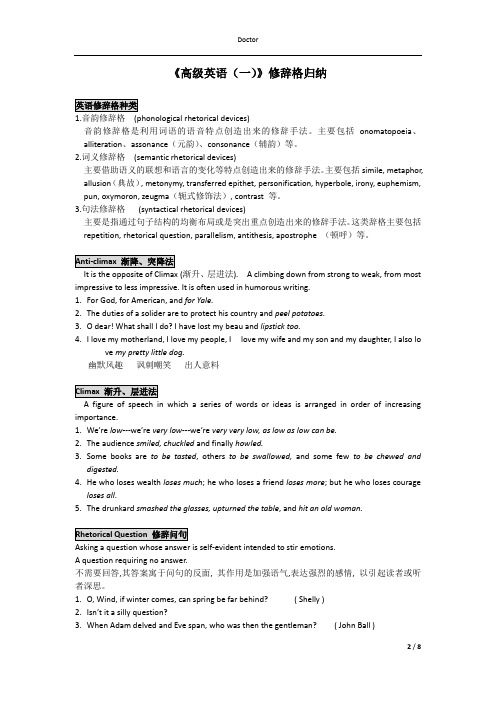
《高级英语(一)》修辞格归纳英语修辞格种类1.音韵修辞格(phonological rhetorical devices)音韵修辞格是利用词语的语音特点创造出来的修辞手法。
主要包括onomatopoeia、alliteration、assonance(元韵)、consonance(辅韵)等。
2.词义修辞格(semantic rhetorical devices)主要借助语义的联想和语言的变化等特点创造出来的修辞手法。
主要包括simile, metaphor, allusion(典故), metonymy, transferred epithet, personification, hyperbole, irony, euphemism, pun, oxymoron, zeugma(轭式修饰法), contrast 等。
3.句法修辞格(syntactical rhetorical devices)主要是指通过句子结构的均衡布局或是突出重点创造出来的修辞手法。
这类辞格主要包括repetition, rhetorical question, parallelism, antithesis, apostrophe (顿呼)等。
Anti-climax 渐降、突降法It is the opposite of Climax (渐升、层进法). A climbing down from strong to weak, from most impressive to less impressive. It is often used in humorous writing.1.For God, for American, and for Yale.2.The duties of a solider are to protect his country and peel potatoes.3.O dear!What shall I do?I have lost my beau and lipstick too.4.I love my motherland,I love my people,I love my wife and my son and my daughter,I also love my pretty little dog.幽默风趣讽刺嘲笑出人意料Climax 渐升、层进法A figure of speech in which a series of words or ideas is arranged in order of increasing importance.1.We’re low---we’re very low---we’re very very low, as low as low can be.2.The audience smiled, chuckled and finally howled.3.Some books are to be tasted, others to be swallowed, and some few to be chewed anddigested.4.He who loses wealth loses much; he who loses a friend loses more; but he who loses courageloses all.5.The drunkard smashed the glasses, upturned the table, and hit an old woman.Rhetorical Question 修辞问句Asking a question whose answer is self-evident intended to stir emotions.A question requiring no answer.不需要回答,其答案寓于问句的反面, 其作用是加强语气,表达强烈的感情, 以引起读者或听者深思。
英语修辞格

修辞格(figures of speech)大体分为三类:音韵修辞格(phonological rhetorical devices );词义修辞格(semantic rhetorical devices)句法修辞格(syntactical rhetorical devices)(一)音韵修辞格(phonological rhetorical devices)Alliteration就是在一个词组或一个诗行中,有两个以上彼此靠近的词,其开头的音节(或其他重读音节)具有同样的字母或声音.Peter Piper picked a peck of picking pepper.(alliteration)皮特.派特咽下了一口腌菜用的胡椒粉。
Assonance是在一句话或在一个诗行中间,有两个或更多的词具有相同的元音。
With this faith we will be able to hew out of the mountain of despair a stone of hope.怀着这个信念,我们能把绝望的大山凿成希望的磐石。
Onomatopoeia是模仿事物发出的声响的修辞手法,与汉语的拟声辞格完全相同。
恰当地运用它可以使语言更加形象生动。
在英美文学终,拟声词的应用非常广泛:如:摹仿金属声的有:clash, clank, ting, tinkle, clang, jangle, ding-dong, tick-tack, etc.摹仿水等液体声的有:splash, bubble, sizz, sizzle, splish-splosh, drip-drop, etc.摹仿各种动物叫声有:neigh, baa, moo, miao, screech, hiss, cook-a-doodle-do, etc.摹仿人的各种声音有:giggle, chuckle, shriek, snort, sneeze, snigger, smack, whisper, grunt, grumble, mumble, sputter, murmur, chatter, gurgle, whoop, etc.note: (词义的转变)英语拟声词往往不仅仅指声音,并兼指产生声音的动作,(即转义后可做动词或名词):如:flap本指扁平物体拍打时发出的“啪嗒”声,但转义后也可做动词“拍打”(动词to flap,名词a flap)又如:bang本指“砰砰”的敲物声,转义后,可指敲物的动作"敲打"(v. to bang, n. a bang)(二)词义修辞格(semantic rhetorical devices)词义修辞格主要借助语义的联想和语言的变化等特点创造出来的修辞手法。
英语修辞格

这类修辞格主要包括simile(明喻), metaphor(隐喻), allusion(暗引或典故), metonymy(换喻), synecdoche (提喻), antonomasia(转喻),transferred epithet(转移修饰), personification(拟人), hyperbole(夸张), irony(反语), euphemism(委婉语), pun(双关), oxymoron(矛盾修辞法), zeugma(轭式搭配法), contrast (对照)等。
Transferred epithet就是把本来应该用于修饰甲事物的定语移去修饰乙事物,一般用修饰有生命事物的形容词来修饰无生命事物。
Personification把非人之事物当作人来描写,把本来只适用于人的词语(如动词、形容词、名词或代词)用来描述物,赋予物以人的属性。
Hyperbole为了强调而故意夸大事实,抒发强烈的情感,以便给人留下深刻的印象。
Irony就是正话反说或反话正说,一般都需要借助特定的上下文和情景才能正确理解。
Euphemism就是把原来显得粗鲁或令人尴尬的语言用温和含蓄的表达方式讲出来,或是把话说得幽默一些。
Repetition是重复使用同一词语、句子或段落,以此强调某一事物的意义,表达强烈的感情。
英语修辞格汇总
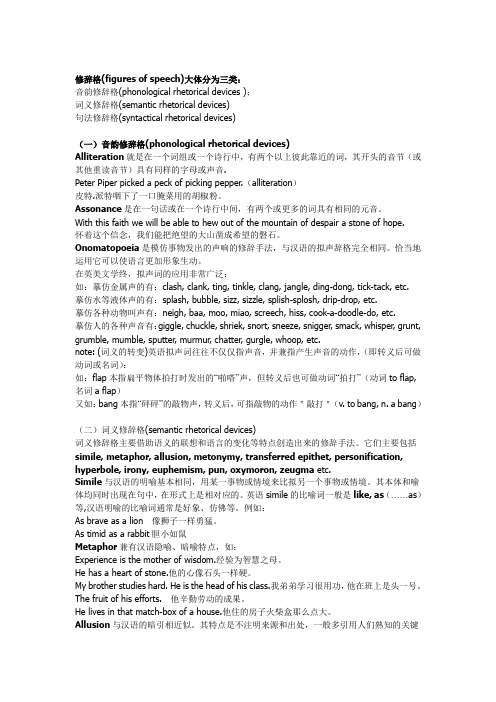
修辞格(figures of speech)大体分为三类:音韵修辞格(phonological rhetorical devices );词义修辞格(semantic rhetorical devices)句法修辞格(syntactical rhetorical devices)(一)音韵修辞格(phonological rhetorical devices)Alliteration就是在一个词组或一个诗行中,有两个以上彼此靠近的词,其开头的音节(或其他重读音节)具有同样的字母或声音.Peter Piper picked a peck of picking pepper.(alliteration)皮特.派特咽下了一口腌菜用的胡椒粉。
Assonance是在一句话或在一个诗行中间,有两个或更多的词具有相同的元音。
With this faith we will be able to hew out of the mountain of despair a stone of hope.怀着这个信念,我们能把绝望的大山凿成希望的磐石。
Onomatopoeia是模仿事物发出的声响的修辞手法,与汉语的拟声辞格完全相同。
恰当地运用它可以使语言更加形象生动。
在英美文学终,拟声词的应用非常广泛:如:摹仿金属声的有:clash, clank, ting, tinkle, clang, jangle, ding-dong, tick-tack, etc.摹仿水等液体声的有:splash, bubble, sizz, sizzle, splish-splosh, drip-drop, etc.摹仿各种动物叫声有:neigh, baa, moo, miao, screech, hiss, cook-a-doodle-do, etc.摹仿人的各种声音有:giggle, chuckle, shriek, snort, sneeze, snigger, smack, whisper, grunt, grumble, mumble, sputter, murmur, chatter, gurgle, whoop, etc.note: (词义的转变)英语拟声词往往不仅仅指声音,并兼指产生声音的动作,(即转义后可做动词或名词):如:flap本指扁平物体拍打时发出的“啪嗒”声,但转义后也可做动词“拍打”(动词to flap,名词a flap)又如:bang本指“砰砰”的敲物声,转义后,可指敲物的动作"敲打"(v. to bang, n. a bang)(二)词义修辞格(semantic rhetorical devices)词义修辞格主要借助语义的联想和语言的变化等特点创造出来的修辞手法。
《英语修辞格》.ppt

Closed simile — We not only compare that man
with a pig, but also specify the respect in which they are compared:
—– The man is “as fat as a pig”.
不用like, as 等连词,而采取其他对 比形式。
爱情跟咳嗽一样是掩盖不了的. —– A word and stone let go cannot be
recalled. (proverb) 说出的话收不回.
II. Metaphor(隐喻)
Metaphor is a figure of speech in which one thing is described in terms of another. In a metaphor, a comparison is usually implicit; whereas in a simile it is explicit.
—– In foreign policy, flying solo can be risky business.
—– He was such a marvelous teacher that whenever he recognized a spark of genius, you should be sure he would water it.
Open simile — —– The man over there is like a pig. In this sentence, the secondary term
“pig” has many characteristics such as fat, lazy, dirty, greedy and gross. In which respect or respects is that man like a pig? It does not say. So, it is called an open simile (it does not give any definite information).
英语修辞格
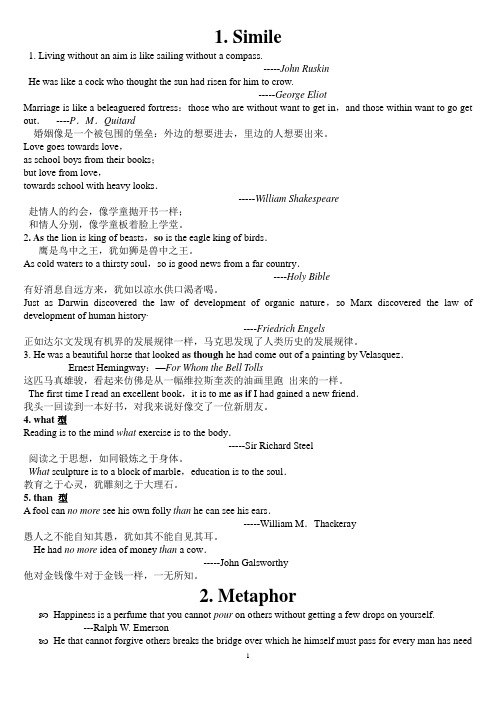
1. Simile1. Living without an aim is like sailing without a compass.-----John RuskinHe was like a cock who thought the sun had risen for him to crow.-----George EliotMarriage is like a beleaguered fortress:those who are without want to get in,and those within want to go get out.----P.M.Quitard婚姻像是一个被包围的堡垒:外边的想要进去,里边的人想要出来。
Love goes towards love,as school boys from their books;but love from love,towards school with heavy looks.-----William Shakespeare赴情人的约会,像学童抛开书一样;和情人分别,像学童板着脸上学堂。
2. As the lion is king of beasts,so is the eagle king of birds.鹰是鸟中之王,犹如狮是兽中之王。
As cold waters to a thirsty soul,so is good news from a far country.----Holy Bible有好消息自远方来,犹如以凉水供口渴者喝。
Just as Darwin discovered the law of development of organic nature,so Marx discovered the law of development of human history·----Friedrich Engels正如达尔文发现有机界的发展规律一样,马克思发现了人类历史的发展规律。
常见英语修辞格(总结版)

常见英语修辞格(总结版)英语常见的修辞格Figures of speech (修辞)are ways of making our language figurative. When we use words in other than their ordinary or literal sense to lend force to an idea, to heighten effect, or to create suggestive imagery, we are said to be speaking or writing figuratively. Now we are going to talk about some common forms of figures of speech.1) Simile:(明喻)It is a figure of speech which makes a comparison between two unlike elements having at least one quality or characteristic (特性)in common. To make the comparison, words like as, as...as, as if and like are used to transfer the quality we associate with one to the other. For example, As cold waters to a thirsty soul, so is good news from a far country.明喻(simile)是以两种具有相同特征的事物和现象进行对比,表明本体和喻体之间的相似关系,两者都在对比中出现。
常用比喻词like,as,as if,as though等,例如:1、This elephant is like a snake as anybody can see.这头象和任何人见到的一样像一条蛇。
英语中几种常见的修辞格
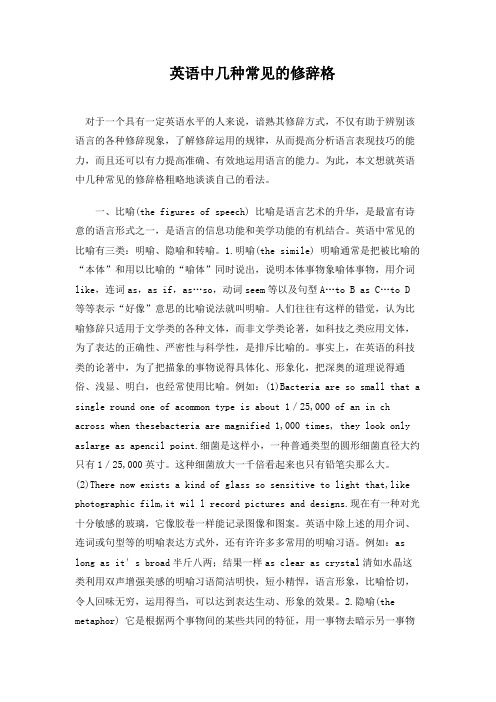
英语中几种常见的修辞格对于一个具有一定英语水平的人来说,谙熟其修辞方式,不仅有助于辨别该语言的各种修辞现象,了解修辞运用的规律,从而提高分析语言表现技巧的能力,而且还可以有力提高准确、有效地运用语言的能力。
为此,本文想就英语中几种常见的修辞格粗略地谈谈自己的看法。
一、比喻(the figures of speech) 比喻是语言艺术的升华,是最富有诗意的语言形式之一,是语言的信息功能和美学功能的有机结合。
英语中常见的比喻有三类:明喻、隐喻和转喻。
1.明喻(the simile) 明喻通常是把被比喻的“本体”和用以比喻的“喻体”同时说出,说明本体事物象喻体事物,用介词like,连词as,as if,as…so,动词seem等以及句型A…to B as C…to D等等表示“好像”意思的比喻说法就叫明喻。
人们往往有这样的错觉,认为比喻修辞只适用于文学类的各种文体,而非文学类论著,如科技之类应用文体,为了表达的正确性、严密性与科学性,是排斥比喻的。
事实上,在英语的科技类的论著中,为了把描象的事物说得具体化、形象化,把深奥的道理说得通俗、浅显、明白,也经常使用比喻。
例如:(1)Bacteria are so small that a single round one of acommon type is about 1/25,000 of an in ch across when thesebacteria are magnified 1,000 times, they look only aslarge as apencil point.细菌是这样小,一种普通类型的圆形细菌直径大约只有1/25,000英寸。
这种细菌放大一千倍看起来也只有铅笔尖那么大。
(2)There now exists a kind of glass so sensitive to light that,like photographic film,it wil l record pictures and designs.现在有一种对光十分敏感的玻璃,它像胶卷一样能记录图像和图案。
修辞格英语的例子

修辞格(Rhetorical devices)是用于增强语言表达效果的技巧和方法。
以下是一些常见的修辞格英语例子:1. 比喻(Metaphor):通过将一个事物比作另一个事物来形成形象生动的表达。
例如:- "He is a shining star in our company."(他是我们公司的一颗闪耀的明星。
)2. 明喻(Simile):通过使用“像”、“如”等词将两个事物进行比较。
例如:- "She sings like a professional."(她唱歌像个专业人士。
)3. 拟人(Personification):将非人类事物赋予人类特征。
例如:- "The wind whispered through the trees."(风在树林中低语。
)4. 排比(Parallelism):通过重复类似的句子结构或短语来增强表达的力度。
例如:- "I came, I saw, I conquered."(我来,我见,我征服。
)5. 反问(Rhetorical question):提出一个问题,实际上并不期待回答,而是用来强调某个观点。
例如:- "Can we ever stop learning?"(我们能否停止学习?)6. 夸张(Hyperbole):通过对某个事物进行过度描述来强调其特点。
例如:- "I have a million things to do."(我有成千上万的事情要做。
)7. 反讽(Irony):通过说与自己真正意图相反的话来表达讽刺意味。
例如:- "I'm so happy to be stuck in traffic."(我太高兴堵在交通中了。
)8. 比拟(Analogy):通过比较相似之处来说明某个概念。
例如:-"The relationship between a teacher and a student is like a garden: the teacher waters the seeds, and the student grows."(教师和学生之间的关系就像花园:教师灌溉种子,学生成长。
英语中的修辞格
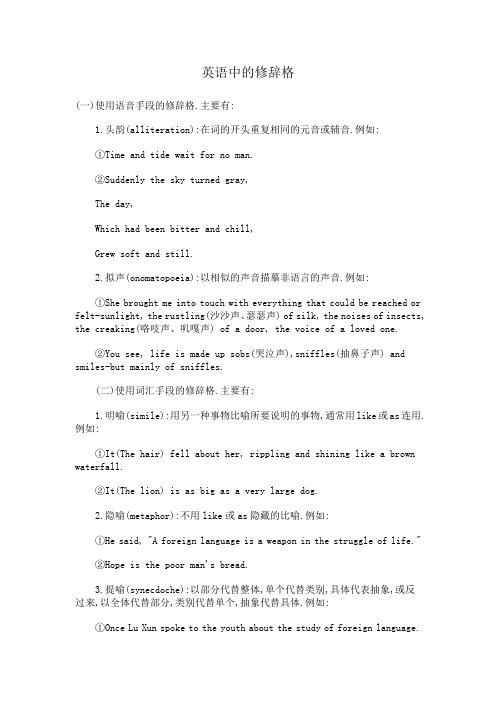
英语中的修辞格(一)使用语音手段的修辞格.主要有:1.头韵(alliteration):在词的开头重复相同的元音或辅音.例如:①Time and tide wait for no man.②Suddenly the sky turned gray,The day,Which had been bitter and chill,Grew soft and still.2.拟声(onomatopoeia):以相似的声音描摹非语言的声音.例如:①She brou ght me into touch with everything that could be reached or felt-sunlight, the rustling(沙沙声、瑟瑟声) of silk, the noises of insects, the creaking(咯吱声、叽嘎声) of a door, the voice of a loved one.②You see, life is made up sobs(哭泣声),sniffles(抽鼻子声) and smiles-but mainly of sniffles.(二)使用词汇手段的修辞格.主要有:1.明喻(simile):用另一种事物比喻所要说明的事物,通常用like或as连用.例如:①It(The hair) fell about her, rippling and shining like a brown waterfall.②It(The lion) is as big as a very large dog.2.隐喻(metaphor):不用like或as隐藏的比喻.例如:①He sa id, "A foreign language is a weapon in the struggle of life."②Hope is the poor man's bread.3.提喻(synecdoche):以部分代替整体,单个代替类别,具体代表抽象,或反过来,以全体代替部分,类别代替单个,抽象代替具体.例如:①Once Lu Xun spoke to the youth about the study of foreign language.[youth不只是抽象名词表"年轻、青春(状态或阶段)",在古英语中就已经可以作集合名词指"青年人"这一整体。
英语修辞格完整版

An Introduction to Figures of Speech(修辞格)Rhetorical Devices(修辞手法)1. Simile(明喻)Simile is an expression of comparison between two different things. It is usually introduced by “as” or “like”, and sometimes also by “as…as/as…so”, and “resemble” as the signs of comparison.明喻就是打比方,指一事物像另一事物的修辞格。
常用的比喻词有“as”or “like”, and sometimes also by “as…so /as…as”, and “resemble”等1). Mercy drops as the gentle rain from heaven upon the place beneath.—Shakespeare2). The cheque fluttered to the floor like a bird with a broken wing.3). Self-criticism is as necessary to us as air to water.4). As a man whispers, so the breeze makes a low, hissing sound.5) Learning resembles scaling the heights.2. Metaphor(隐喻/暗喻)Metaphor contains an implied comparison, in which a word or phrase ordinarily or primarily used of one thing is applied to another. In other words, it calls one thing by the name of another or one thing is described in terms of another.隐喻是一种隐含着比喻的修辞格,它直接把一种事物比为另一种事物,不用比喻词,通常比较含蓄。
高级英语(1)修辞格

一.词语修辞格(1)simile 明喻它根据人们的联想,利用不同事物之间的相似点,借助比喻词(如like,as等)起连接作用,清楚地说明甲事物在某方面像乙事物I wandered lonely as a cloud. (W. Wordsworth: The Daffodils ) 我像一朵浮云独自漫游。
They are as like as two peas. 他们两个长得一模一样。
His young daughter looks as red as a rose。
他的小女儿面庞红得象朵玫瑰花。
①The oratorial(雄辩的)storm that Clarence Darrow and Dudley Field Malone blew up in the little court in Dayton swept like a fresh wind though the schools…②I see also the dull(迟钝的),drilled(训练有素的),docile(易驯服的), brutish(粗野的) masses of the Hun soldiery plodding(沉重缓慢地走)on like a swarm(群)of crawling locusts(蝗虫).(2)metaphor 暗喻暗含的比喻。
A是B或B就是A。
All the world’s a stage, and all the men and women merely players演员。
( William Shakespeare )整个世界是座舞台,男男女女,演员而已.Education is not the filling of a pail桶, but the lighting of a fire. ( William B。
Yeats )教育不是注满一桶水,而是点燃一把火。
①It is a vast(巨大的), sombre(忧郁的)cavern(洞穴)of a room,…②Mark Twain ——— Mirror of America③main artery(干线)of transportation in the young nation’s heart④We shall fight him by land, we shall fight him by sea,we shall fight him in the air, until, with God’s help, we have rid the earth of his shadow and liberated its peoples from his yoke(枷锁)。
- 1、下载文档前请自行甄别文档内容的完整性,平台不提供额外的编辑、内容补充、找答案等附加服务。
- 2、"仅部分预览"的文档,不可在线预览部分如存在完整性等问题,可反馈申请退款(可完整预览的文档不适用该条件!)。
- 3、如文档侵犯您的权益,请联系客服反馈,我们会尽快为您处理(人工客服工作时间:9:00-18:30)。
Scheme (syntax, e.g. parison)
Trope (semantics)
(word-meaning, e.g. metaphor)
(discourse sense or mode, e.g. irony
Page 5
1.4 Today:
Figures of speech refer to all kinds of striking or unusual configurations of words or phrases. They involve the variation of any unit of the language system: graphic, phonological, morphological, syntactic, semantic, and pragmatic. Figures of speech are very common and our everyday usage is naturally figurative, or at least figurative by preference. For example: (1) The news is a dagger to his heart. (2) Give us this day our daily bread. (3) The pen is mightier than the sword. (4) Unhappiness always hits you when you are unprepared.
Page 13
• a great help to memory. • catches the attention of the audience and makes the idea impressed deeply on the audience and thus easier for them to remember. • Appropriately used, it can achieve intended goal. • Used to excess, it can be laughable and harmful to the conveyance of thought. • well suited to poetry, but often an obstruction to clear prose. In prose, it should be used sparingly.
Page 3
1. What is a figure of speech
1.1 In classical rhetoric:
The figure of speech was termed “trope”(修辞 比喻). Tropes have ” 修辞,比喻 修辞 比喻 to do with the way words are made to mean other than what they would normally imply, involving the deviation from its ordinary and literal meaning. They are ways of making language figurative.Tropes include metaphor,irony,and synecdoche.
Page 14
Assonance
• “late and make”, • “fish and chips” • “a deep green stream”. • Assonance(叠韵/半谐音) is the repetition or resemblance of vowel sounds in the stressed syllables of a sequence of words, preceded and followed by different consonants.
Page 12
Alliteration Function
• d. in proverbs: • A gloved cat catches no mice. • Death pays all debts. • e. in tongue twisters: • Peter piper picked a peck of pickled pepper. • f. in advertisements and slogans: • Workers of the world, unite!
Page 4
1.3 According to Walter Nash:
The “figure” is the superordinate term (上义词 , applicable to any 上义词) 上义词 rhetorical device. He divided it into “figures of syntax” and “figures of semantics” which was further divided into “word semantics” and “discourse semantics”.
Page 6
2 Why are figures of speech used
Figures of speech aim at increasing vividness of language. They are used to embellish, emphasize or clarify expressions, to make the language more colorful, more forceful, or more explicit, and thus making communication more efficient and more effective. For example: (1) a. Stars twinkle like diamonds in the sky. b. Stars shine brightly in the sky. (2) a. Imperialism is a paper tiger. b. Imperialism appears to be strong but inwardly it is weak. (3) a. The experiment ended in failure again. It was a blow between the eyes to them. b. The experiment ended in failure again. It was a sudden shock to them.
Page 9
Phonetic Figures of Speech
• • • • • 1 Alliteration 2 Assonance 3 Consonance 4 Onomatopoeia 5 Pun
Page 10
Alliteration
• safe and sound, bigger and better, might and main, sweet smell of success • Alliteration(双声/头韵): the repetition of initial consonant in two or more words, derived from Latin, meaning “repeating and playing upon the same letter”.
Page 11
Alliteration Function
• Function : for sound rhyme, musical effect and significant emphasis. • • • • • • • • • • Uses: a. in poetry: The fair breeze blew, the white foam flew, The furrow followed free; … b. in prose: They are fight for their hearth and home. c. in newspaper headings: Bread not Bombs Better Active Today than radioactive tomorrow
Page 8
3. The classification of figures of speech
In the lecture, we introduce Figures of Speech as follows: Phonetic Figures Of Speech Syntactic Figures Of Speech Figures Of Speech Semantic Figures Of Speech Logical Figures Of Speech
1.2 In the sixteenth century:
The term “figure of speech” was the synonym of “scheme”. Schemes comprised the figures that arranged words into schematized patterns of foregrounded regularity of form, syntactic or phonetic.
Page 7
2. Use figures of speech in a right way
Figures of speech add vigor and emphasis to language, but we cannot depend on much on them. Figures of speech are aids to, not ends of, writing and speaking. They should be appropriately used. If used casually or excessively, almost any of them will probably seem affected, dull, awkward, or mechanical.
